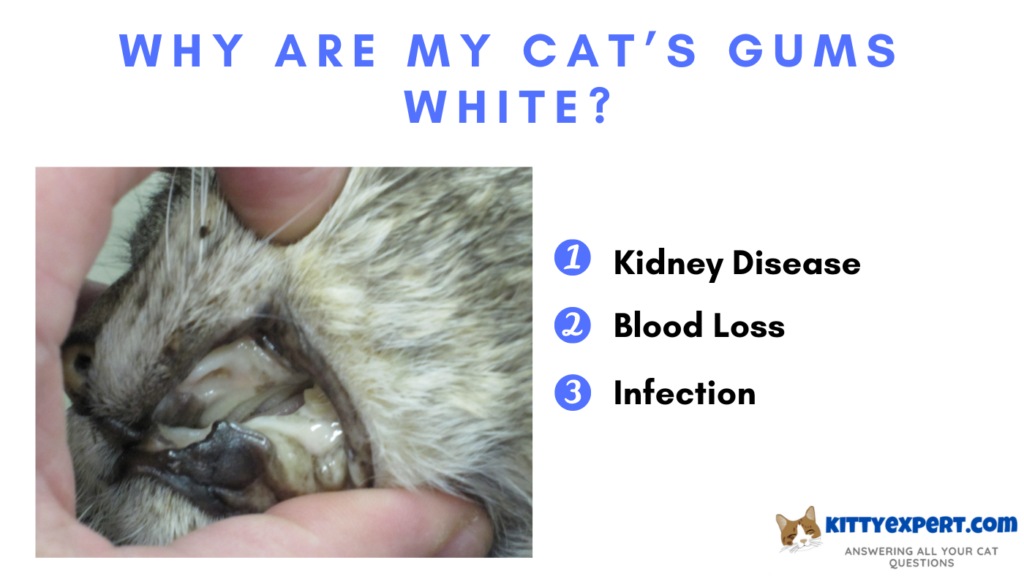Making sure your cat’s teeth and gums are in good shape is an essential aspect of being a good caretaker. Dental health is incredibly important for your cat’s overall health, so it’s a good idea to check the state of their gums and teeth often. Normal, healthy cat gums should be a pink color.
If you notice that your cat’s gums are very pale pink or even white, there might be something more serious going on. In this article, we’ll explore various reasons why your cats gums are white and the next steps that you need to take.
Why Are My Cat’s Gums White?
White gums, regardless of the underlying health issue, always indicate that your cat is not experiencing proper blood flow.
There can be many health reasons that would cause white gums that we will explore in this article, but the presence of white gums always indicates a lack of proper blood flow. This is also known as anemia.
Anemia is a sign of a potentially very severe health issues, and it is something that needs to be taken seriously. You can typically tell the severity based upon how pale the gums are. The more pale they are, the less blood is being circulated.
If your cat’s gums are white, it’s very important to take them to see a veterinarian as soon as possible. Anemia indicates that your cat has a red blood cell deficiency. This means there isn’t enough oxygen is being passed through the body. Your cat may or may not present other symptoms of anemia. Regardless, white gums alone are cause enough to visit your veterinarian to get more information.
Underlying Causes of Anemia
Anemia is not the root of the problem, but rather a symptom. There are a variety of different health conditions that could cause anemia in cats. Whether your cat has one of the conditions we’ll discuss or not, you should take them to the vet in all circumstances where their gums are clearly pale or white.
Kidney Disease
Kidney disease is an example of a disease that causes non-regenerative amenia. This means that the red blood cells will not regenerate on their own because the disease is impacting the body’s ability to do so. Other causes of non-regenerative anemia include cancer, leukemia, or autoimmune deficiencies. These conditions need to be treated by a medical professional.
If your cat’s condition continues to get worse, you should read my guide on when to euthanize a cat with kidney disease.
Blood Loss or Wounds
Unlike kidney disease or cancer, which cause non-regenerative anemia, blood loss or injury are examples of causes of regenerative anemia. Regenerative anemia means that the body will naturally respond to the loss of red blood cells by creating more blood cells.
This typically indicates that the cause of the anemia is external rather than internal. Blood loss and injury are causes of regenerative anemia. If your cat has been injured and they are losing blood, their gums may turn white. This is caused by the body’s response to the temporary loss of red blood cells.
While your cat still needs to be properly treated by a medical professional if they are losing enough blood to turn their gums white, the white gums should go away as soon as your cat’s wound is treated.
Infection
If your cat contracts an infection or disease, they may experience anemia and white gums. Illnesses inflicted by fleas and ticks are especially likely to cause anemia, so it is important to implement pest prevention. I also recommend that you frequently give your cat a flea bath.
If you suspect that your cat has contacted an illness or infection that is causing your cat to be anemic, it is important to visit the veterinarian as soon as possible.
Final Thoughts
If you notice that your cat’s gums are pale or white, it’s important to get them to a veterinarian as soon as possible. Pale or white gums are indicative of anemia, a condition caused by a lack of proper blood circulation and a red-blood cell deficiency.
Anemia can be caused by lots of different conditions and can be non-regenerative or regenerative. Though both indicate that your cat needs medical attention, non-regenerative anemia is more likely to need more intensive or long-lasting treatment.
Make sure that you are regularly checking on the condition of your cat’s teeth and gums. Their dental health is incredibly important and revealing. You can learn a lot about your cat’s overall health by examining their dental health. And, if you notice white gums, make sure to get to a veterinarian as soon as you can.

